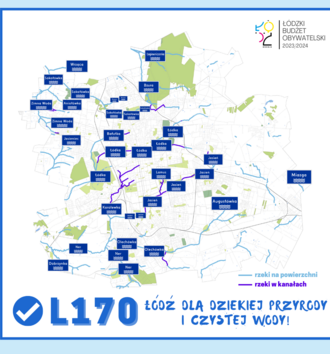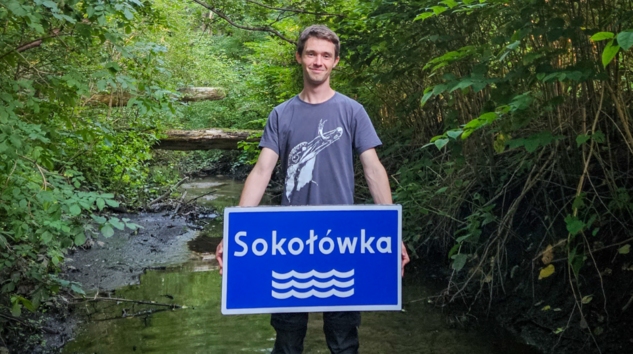The goals and effects of the project are to be achieved by installing information signs (F4 type boards) in 10 locations where Lodz rivers flow under the most frequently used streets. As part of the project implementation, information about the rivers flowing under them will appear on many sidewalks in the city.
What I want is to take the rivers of Lodz out of the channels of human unconsciousness, which will allow for their more effective protection and create an opportunity to take further steps to renaturalise them
– explains Jarosław Brodecki.
The project also assumes increasing the number of habitats for bats and swifts (which greatly reduce the number of insects!) and will protect an extraordinary reserve in our city against invasive plant species that destroy it.
Lodz is celebrating its 600th anniversary this year, and still few residents of Lodz know the natural context of our city creation and its enormous development success. The forests and rivers that surrounded 19th-century Lodz were the factor that determined the location of this industrial city. Initially, two rivers in Lodz were the most important in the industrial history – Łódka and Jasień. The industrial "kingdoms" of Poznański and Scheibler were established on these two rivers.
Within the current city borders, we can find 19 still flowing rivers and traces of the past of several others that were absorbed by the urbanisation processes a long time ago. Despite so many rivers flowing through Lodz, few residents of the city are even aware of the existence of these two most important rivers in the city's history. This is largely due to the fact that in the city centre these rivers flow in covered canals under the city streets.
However, Lodz rivers are not only history but also very nature-oriented present. Almost half of the area forms of nature protection in Lodz are related to the current river valleys!
Only an aware society can take actions and decisions related to the protection of the city's natural network based on the river valleys. This is especially important in the era of climate change, when urban nature will mitigate the effects of heat waves and other weather extremes. That's why I have created this project
– adds Jarosław Brodecki.
For the rivers of Lodz to become a part of the mass awareness of Lodz residents, we need solutions that are mass-available and noticeable to every user of urban space. Therefore, as part of the project, they will be marked with the river-type road signs in ten locations where the rivers flow under the city's most frequented streets. Thanks to this, thousands of people every day will be exposed to information about rivers in the city. Moreover, the project assumes marking the course of Lodz rivers on city sidewalks with blue road paint. This way, we will manage to bring them to the surface, at least symbolically. Hundreds of city residents use public transport every day, so the project also assumes resuming and creating further videos about Lodz rivers, which will be displayed on monitors in MPK (Urban Transport Company) buses and trams.
Rivers are not the only valuable element of our native Lodz nature. Therefore, the project assumes installation of boxes for swifts in the city tenement houses and – even more importantly – slot boxes for bats in the forest parts of city parks. This is particularly important because this unique group of flying mammals requires active protection from us. Moreover, as part of the project, inspired by classes on nature and environmental protection at the University of Lodz Faculty of Biology and Environmental Protection, I proposed measures aiming at protecting one of the most unique nature reserves in Poland – Polesie Konstantynowskie, from the negative impact of invasive alien species
– says the author of the project.
Source: Jarosław Brodecki, Faculty of Biology and Environmental Protection, University of Lodz
Edit: Communications and PR Centre, University of Lodz
Photos and illustrations come from materials promoting Jarosław Brodecki's project in the Lodz Participatory Budgeting.





